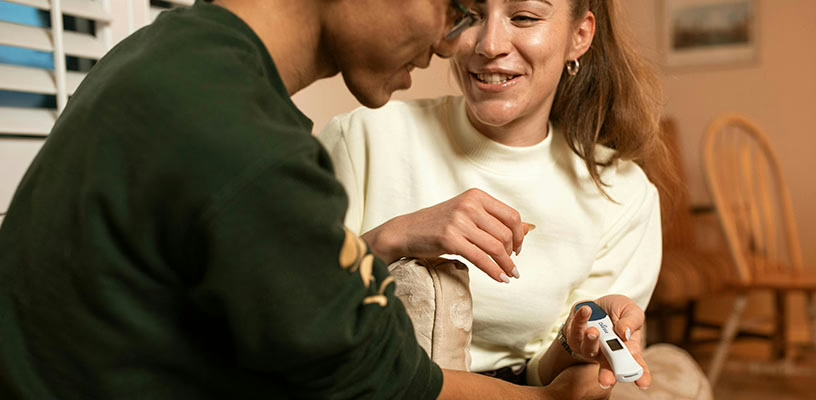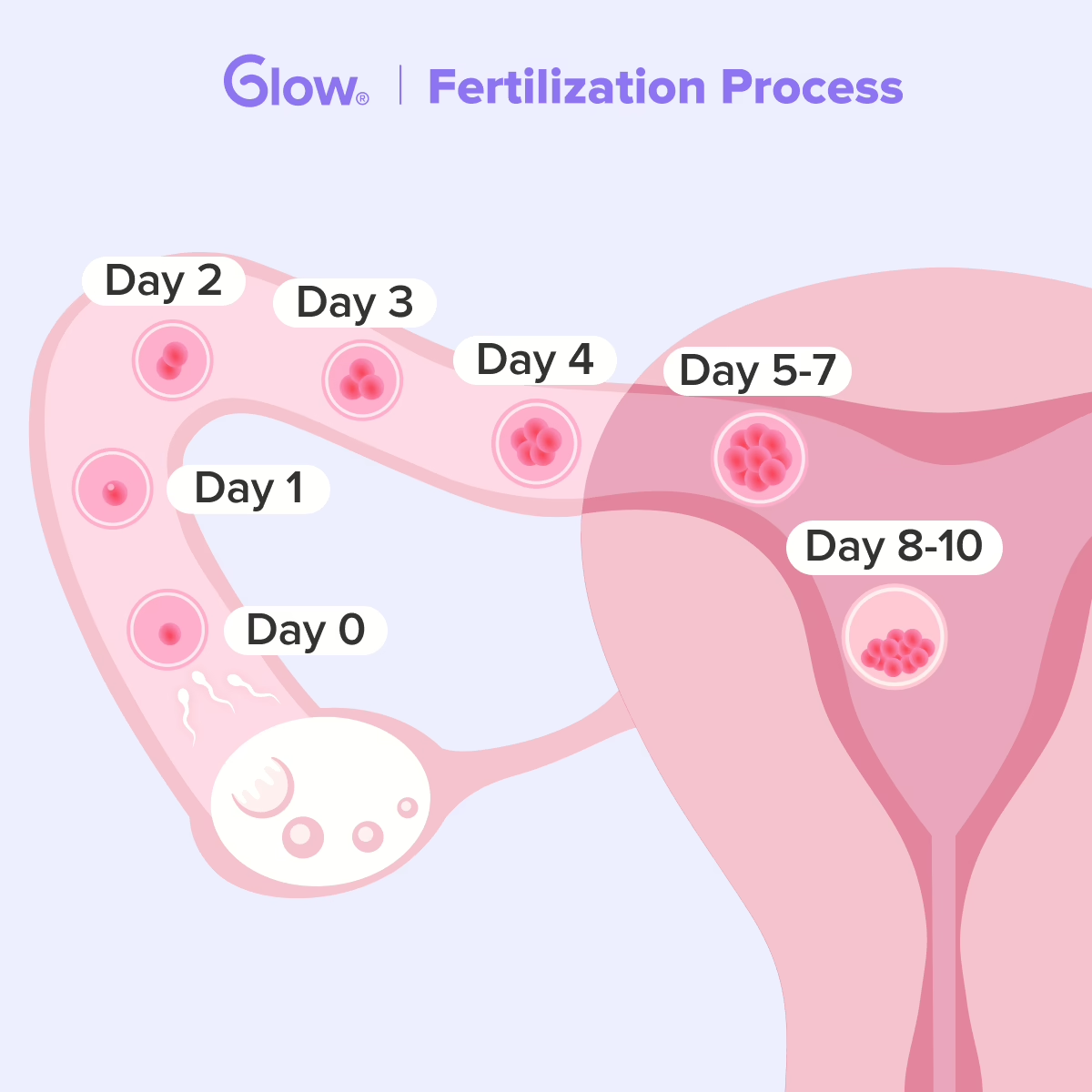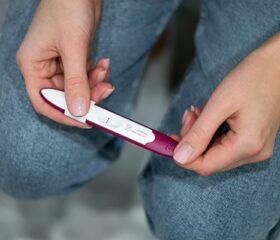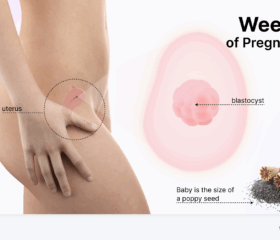When Does Implantation Occur in Pregnancy? Process and Signs
It's finally move-in day for your reproductive system—the time when the world's tiniest tenant (that little fertilized egg) takes up residence in your womb. This is known as implantation.

Implantation is a very important (albeit hard-to-notice) process. It marks the true beginning of pregnancy, triggering a cascade of hormonal changes that prepare your body for the journey ahead.
What is implantation?
Implantation is the embedding of the blastocyst (a ball of cells formed after fertilization) into the uterine lining. This happens about five to six days after the sperm fertilizes the egg, when the blastocyst makes the journey from the fallopian tube to your uterus. 1
Once it arrives inside your uterus, the blastocyst attaches to the uterine wall and burrows into it, where it starts receiving nutrients and support from your body. This process may take a few days—implantation isn’t instantaneous.

After this, the blastocyst’s outer layer will help form the placenta, while the inner layer will grow into an embryo, and, eventually, a fetus. 2
When does implantation occur?
Exactly when implantation happens depends on you. Normally, it occurs between 6 to 12 days after you ovulate, around the sixth day after conception. 3
If you have a regular 28-day menstrual cycle, your ovulation usually occurs midway through, around day 14. That means that if you conceive, implantation will probably happen between days 20 and 26 of your cycle.
However, if your cycle is irregular, it’s harder to pinpoint exactly when you might be ovulating. Every woman’s cycle is different, and these are just averages. Note that you can confirm when you’re due to ovulate by regularly using ovulation test strips. You can also plug your cycle into an online ovulation calculator to get a better idea of your fertile window.
What are the symptoms of implantation?
Will you really feel implantation happening? This question has a frustrating answer: maybe.
Some women experience noticeable signs, while others don’t feel a thing. While the absence of symptoms doesn’t necessarily mean you’re not pregnant, here’s a list of what to look out for:
Light bleeding
As the embryo sinks into the uterine lining, it disrupts the blood vessels there, resulting in light bleeding (spotting).
If you’re one of the minority of women (7%–24%, per some estimates) who experience implantation bleeding, you’ll see pink or brown discharge (not clots or period flow) for around a few hours to two days. 4
Cramping
Don’t worry—implantation cramps are usually milder than menstrual ones. About a week before your next period would have come, you may feel slight twinges of discomfort (or a tingling or “prickling” sensation). This happens when the egg attaches to the uterine wall and may last about two to three days. 5
Other subtle changes
You may notice some of the telltale signs of early pregnancy, including: 5
- Breast pain and tenderness
- Nausea and headaches
- Bloating and constipation
- Mood swings
- Fatigue
- Nasal congestion
- Food aversions
Many pregnancy symptoms are similar to premenstrual syndrome (PMS) symptoms. That makes it difficult to distinguish between the two.
The only surefire way to tell that you’re pregnant is to take a test. You can use an at-home pregnancy testing kit (which checks your urine for the presence of the pregnancy hormone hCG) the day you miss your period, although if you wait a few more days, the results will be more reliable.
What is an implantation dip?
If you’ve been regularly tracking your basal body temperature (BBT)—in other words, your lowest possible body temperature—it’s possible (although far from certain) you’ll notice a sudden but small drop (around 0.3 °F) around the time that an egg might be nestling into your uterine lining. This is known as the implantation dip. 6
Since your basal temperature usually rises after ovulation by about 0.4 °F to 1 °F, you may interpret a decrease as confirmation that the egg successfully attached to the lining.
However, these temperature fluctuations are not reliable indicators. The existence of the implantation dip hasn’t been medically proven, and your BBT can be influenced by other factors, such as stress, drinking, and a lack of sleep, as well as normal biological variation. 7
When should you take a pregnancy test?
Seeing implantation symptoms can be exciting. However, as mentioned, it’s important to take a pregnancy test when the timing’s right to confirm your suspicions.
When to test if you’re conceiving naturally
After implantation, the developing placenta produces a hormone known as human chorionic gonadotropin (hCG). Certain highly sensitive hormone tests can detect hCG as early as eight days following your ovulation, which means you can find out if you’re pregnant days before you actually miss your next period. 8
However, it’s generally advised to wait a little longer before testing—at least until a day after your period is due (around 14 days after you last ovulated). 9 This is because hCG takes time to accumulate in your urine, and if you test too early, you might get a false negative result (or an unclear result, like a faint line on your pregnancy test).
What if you have an irregular cycle?
It’s perfectly possible to get pregnant with irregular periods, but they can make it hard to determine when you should take a test.
To avoid disappointment, keep track of your menstrual cycle so that you don’t end up being one of the 10%–20% of pregnant women who get a false negative result. Doing so may also give you a better idea of how long it’ll take you to get pregnant. 10
When to test if you’re using assisted reproductive technology (ART)
If you’re undergoing a fertility treatment like in vitro fertilization (IVF), implantation usually occurs between 6 to 10 days after the transfer of the frozen embryo.
Beyond that window, it’s considered a late implantation. Delays like this can be caused by issues with the thickness of your uterine lining, embryo quality, the thawing process, and hormone production. 11
When you’re conceiving through assisted means, it’s a good idea to consult with your doctor to confirm if you’re pregnant.
What pregnancy complications can cause implantation to fail?
Implantation is normally a smooth process. However, as with all aspects of pregnancy, sometimes complications can arise.
Chemical pregnancy
In some cases, a blastocyst will successfully reach your uterus. However, it may stop developing, either because it didn’t attach properly to the uterine wall or because there are issues with its DNA structure. These problems may result in early pregnancy loss within the first five weeks, also referred to as a chemical or biochemical pregnancy. 12
Pregnancy loss is—unfortunately—very common. Approximately 25% of women miscarry before they reach the 20th week, and 80% of these cases happen during early pregnancy. 12 This can be emotionally devastating, but the silver lining is that it won’t affect your ability to conceive again in the future.
Ectopic pregnancy
In a normal pregnancy, the egg attaches to your inner uterine wall. In contrast, in an ectopic pregnancy, the egg implants outside the uterus, most commonly in the fallopian tube or in the spot where the tube meets the uterus. It can also occur in your ovaries, cervix, abdomen, bowels, or even in a prior C-section scar. 13
An ectopic pregnancy is a serious condition that can lead to life-threatening emergencies like a ruptured fallopian tube. If you suspect you have one, see a doctor right away.
Some symptoms, like pain in your lower back and abdomen, may be hard to distinguish from those of a normal pregnancy. However, other signs are more obvious, including vaginal bleeding and the other signs of internal bleeding, such as: 14
- Shoulder pain
- Sharp, intense pain in your abdominal or pelvic area
- Weakness, dizziness, or lightheadedness
- Signs of shock, including a rapid pulse and breathing, discoloration of the face, an altered mental state, and nausea and vomiting 15
Why does implantation fail?
While a failed implantation can be heartbreaking, try not to blame yourself—it’s usually caused by factors outside of your control, such as: 16
- Hormone imbalances: Your egg needs a steady supply of certain hormones to grow. Conditions like thyroid disorders and polycystic ovary syndrome (PCOS) can throw off both your hormone balance and your menstrual cycle, which complicates implantation.
- Uterine lining issues: If your uterine wall is too thin, thick, or has other abnormalities, it’s harder for the egg to implant. If you have conditions like uterine fibroids and endometriosis (where cells like those in the lining grow outside of the uterus instead), that can affect the quality of the lining.
- Immune diseases: A hyperactive immune system can lead to conditions like antiphospholipid syndrome (APS), in which the body produces too many antibodies, increasing the risk of blood clots. These clots disrupt the placenta’s ability to nourish the embryo.
If you suspect you have any of these conditions, speak to your doctor to get hormone and blood tests, which can assess your risk of failed implantation.
Your doctor may also perform an ultrasound and hysteroscopy to identify abnormalities in your reproductive system and address the underlying factors affecting your fertility (whatever they are). A fertility specialist will also help you explore your treatment options going forward.
Your options if you have recurrent implantation failure
Sometimes, you may have trouble with implantation even while pursuing assisted fertility treatments. After three unsuccessful attempts with IVF, you may hear your doctors use the term “repeated/recurrent implantation failure” (RIF).
Again, if you have RIF, it may be for reasons beyond your control, such as preexisting conditions that affect your reproductive system. The success rate of your IVF treatment also depends on your age and the quality of the father’s sperm. 17
When should you see your doctor about implantation?
See a doctor if you experience worrying symptoms like pain, heavy bleeding, or any of the others outlined earlier.
If you’re concerned about your chances of success with implantation—in particular, if you’ve been unsuccessfully trying to conceive for over a year—it’s also never a bad idea to see a professional.
Sometimes, all it takes are a few lifestyle changes, like eating a better diet or getting enough exercise. Other times, your doctor may be able to refer you for hormone therapy, which helps your body regulate its hormones and support your uterine lining. 16
Final thoughts
The small but significant process of implantation lays the foundation for your pregnancy. It’s a delicate step, with many factors influencing its success, so it’s natural if you feel a little apprehensive about it.
Whether you’re trying to conceive naturally or navigating fertility treatments, your doctor is always there if you have any concerns at all.
Article Sources
- UCSF Center for Reproductive Health. "Conception: How It Works" Retrieved April 8, 2025.
- ScienceDirect. "Blastocyst" Retrieved April 8, 2025.
- Healthline Media LLC. "When does implantation happen?" Retrieved April 8, 2025.
- Annals Epidemiology. "Patterns and predictors of vaginal bleeding in the first trimester of pregnancy" Retrieved April 8, 2025.
- RMC Health System. "Implantation Cramping vs. Period Cramps" Retrieved April 8, 2025.
- Parents. "Implantation Dip And Why It's Not Reliable" Retrieved April 8, 2025.
- Cleveland Clinic. "Basal Body Temperature" Retrieved April 8, 2025.
- The University of Texas Southwestern Medical Center. "How early can home pregnancy tests show positive results?" Retrieved April 8, 2025.
- Penn Medicine Lancaster General Health. "5 Things to Remember During the Two Week Wait" Retrieved April 8, 2025.
- U.S. Food & Drug Administration. "Pregnancy" Retrieved April 8, 2025.
- Inito. "Late Implantation: How It Affects Being Pregnant" Retrieved April 8, 2025.
- Penn Medicine Lancaster General Health. "What Is a Chemical Pregnancy?" Retrieved April 8, 2025.
- StatPearls. "Ectopic Pregnancy" Retrieved April 8, 2025.
- American College of Obstetricians and Gynecologists. "Ectopic Pregnancy" Retrieved April 8, 2025.
- The American Red Cross. "Shock" Retrieved April 8, 2025.
- The Fertility Foundation. "When Conception Fails: Identifying Symptoms of Failed Implantation" Retrieved April 8, 2025.
- PUAH. "IVF Failure: Is Sperm Quality to Blame?" Retrieved April 8, 2025.







